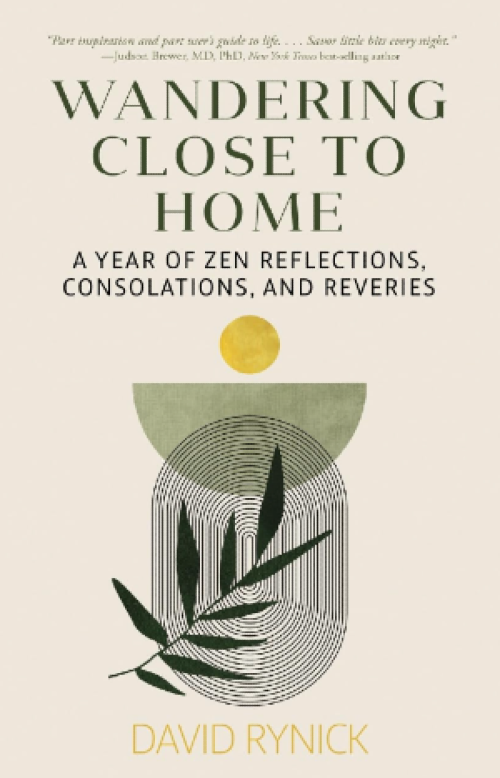Wandering Close to Home: A Year of Zen Reflections, Consolations, and Reveries
"Our essential choice is whether or not we align with what is already true."

David Dae An Rynick Roshi has been a good friend and colleague for about fifteen years. A few months ago, he asked me to read his new book and write a blurb for it. It's a project he's been working on diligently since the beginning of the Pandemic. Of course, I took him up on it and I'm glad I did - reading David's book was a such a delight.
In this post, I'll first share what I wrote about the book, a bit about David, and an excerpt, "Do Nothing." I gotta say that David is really good at doing nothing - while getting a whole lot done.
David's second book. Wandering Close to Home: A Year of Zen Reflections, Consolations, and Reveries, reminds me of the Zen classic Zen Mind, Beginner's Mind in that it conveys the feeling tone of the Zen way so very well.
Here's what I wrote about Wandering Close to Home:
This is a healing book for the heart. I've had the deep pleasure of knowing David Rynick for many years. Reading his book gave me a chance to hang out with him in his garden again. I believe you will also find Wandering Close to Home to be a wonderful read, like scooping cool water from a clear pool. My advice - read it slowly. Or rather, savor it. The sections are short (like this one life), after all, and so there is no hurry. There are so many lines that caused me to pause, breathe, and read even more slowly, like this: "Our essential choice is whether or not we align with what is already true.
Wandering Close to Home is available now - so please do click away and buy it. By the way, it would also make a great gift to those near and dear to you who are curious about Zen. I'm confident that you will also find David's reflections healing for your heart.
Just look at this sweet guy:

Here's bit about David:
David Dae An Rynick Rōshi, is a founder and Guiding Teacher of Boundless Way. He received Dharma transmission in both the Korean Rinzai lineage through Zen Master George Bowman and in the Japanese Sōtō lineage through James Ford Rōshi. He the author of This Truth Never Fails: A Memoir in Four Seasons and Wandering Close to Home: A Year of Zen Reflections, Consolations, and Reveries. David is also a life and leadership coach who works with spiritual leaders from many different traditions as well as with individuals seeking to align their lives with their deepest wisdom. More information and his blog can be found at www.davidrynick.com.
Here's the passage from Wandering Close to Home:
28 Do Nothing
In the late eighties, I attended one of the first conferences featuring women Zen teachers. It was at the Providence Zen Center and I don’t remember much about it except one particular moment. The late Zen teacher Maurine Stuart, one of the first Western women to receive Zen teaching transmission, was speaking. She was going on and on in front of a group of about sixty or seventy of us about the great ninth-century Chinese Zen Master Rinzai. I was moderately interested but was also thinking about my dinner plans when she paused. She seemed to look directly at me, one of the few men in the audience, and said, with a great smile on her face, “The great Zen Master Rinzai said, ‘Dooooooo . . . nothing.’” She looked away and went on talking.
I have not forgotten.
For these past thirty-some years, I have tried to understand what this wondrous injunction might mean. From the everyday perspective, it is clearly nonsense. We have to do things. We have obligations and necessities. We have wants and needs. We must constantly choose one thing over another. Do I have a cup of coffee now or do I wait till after meditation? Do I stay inside to begin to clear off the piles of papers teetering on my desk or do I go outside and plant the seedlings longing for their outdoor home in the garden?
This doing nothing found its way into Zen Buddhist teachings through China’s rich and subtle Taoist tradition. Lao Tzu, the legendary Taoist teacher who dates back to the sixth century BC, wrote of the mysterious possibilities of wei wu wei—doing not doing. The emphasis here, as it is with Rinzai, is in the active engagement required by this form of “not-doing.”
How do I actively “Dooooooo . . . nothing?” Is it possible, even when doing something to do nothing?
Doing nothing is an invitation to abandon our great and complex plans and give ourselves to the activity of the moment. Doing nothing is an invitation to the intimacy of everyday life—not transcending or going beyond, but rather fully entering and participating in what is already here.
Usually, in our activity, we fix our focus on the outcomes we want. “I’ll do this so that will happen.” This is important and useful thinking that allows us to pay our bills and plant our gardens. We might say it is necessary but not sufficient. A life that is filled with plans and obligations and effort is exhausting and ultimately disappointing.
But what if we did whatever we were doing without being so focused on what will happen next? What if we appreciated the activity of the moment without so much regard to the outcome? Of course, sometimes we get what we want and sometimes we don’t. Sometimes we succeed and sometimes we fail. Sometimes we are praised and sometimes we are blamed. What if that’s not a problem?
Wholehearted engagement in this moment can begin to stop or limit the habit pattern of the mind’s leaping ahead. The default position that we have practiced all our lives is to be thinking ahead. Without clear intention and practice, the horse of the mind usually gallops off into the future and drags us along with it.
The luxury of doing nothing is available to us all. Fingers dart and poke across the keyboard without thought. Feet walk and body balances in effortless brilliance. The light shines on the wet porch floor from last night’s rain. The trees, dressed now in their full summer leaves, watch as the uncut Temple lawn blooms with buttercups.
May 29
